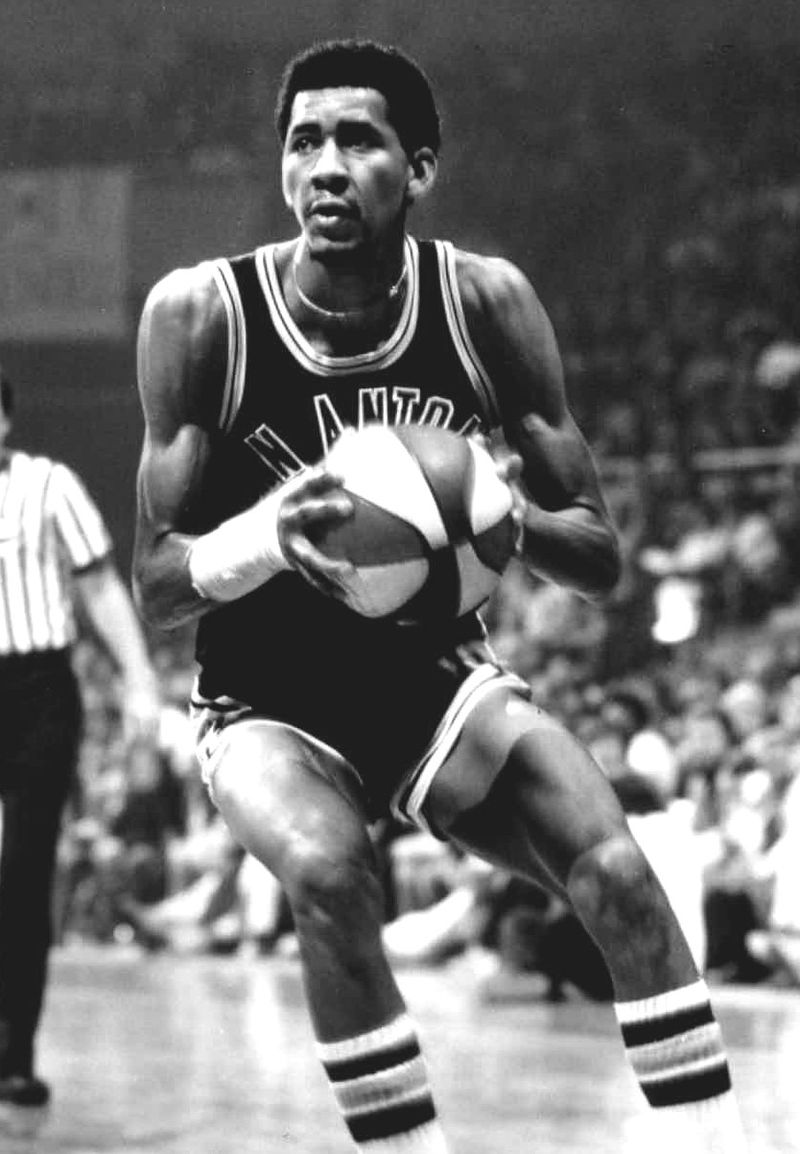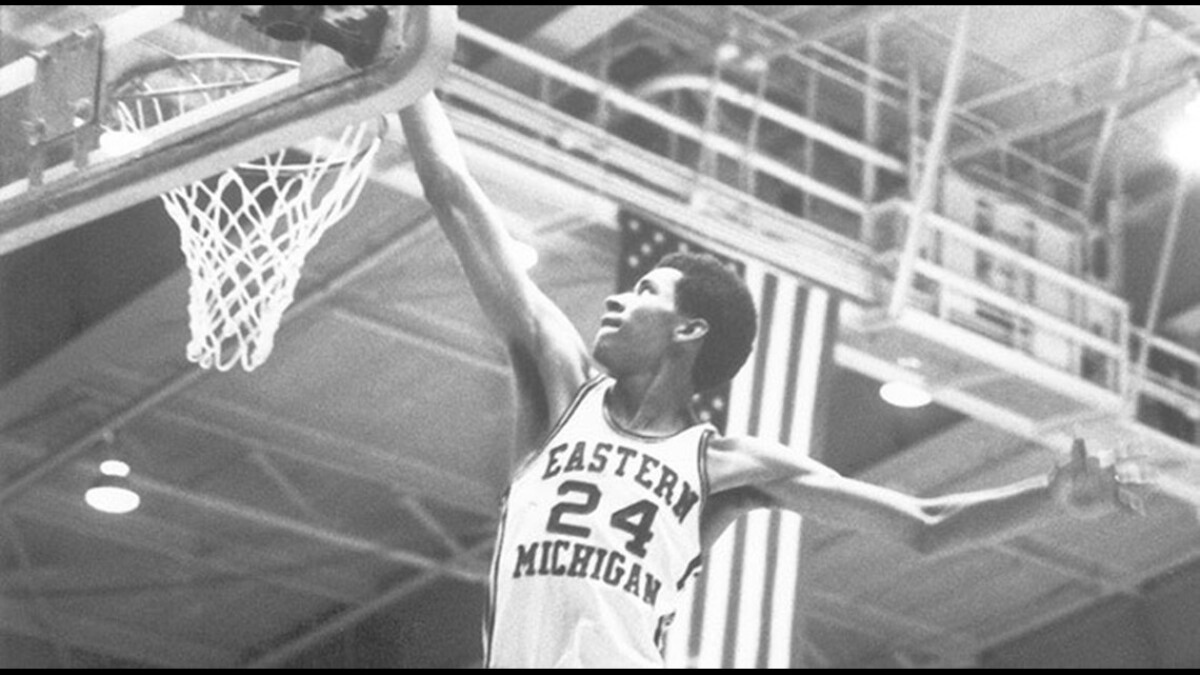George Gervin
George Gervin

George Gervin, born on April 27, 1952, and famously known as "the Iceman," is a retired American professional basketball player who had an illustrious career in both the American Basketball Association (ABA) and the National Basketball Association (NBA). Gervin played for teams such as the Virginia Squires, San Antonio Spurs, and Chicago Bulls.
Throughout his career spanning 14 seasons in the ABA and NBA, Gervin consistently averaged over 14 points per game. His scoring prowess was remarkable, and he concluded his NBA tenure with an impressive career average of 26.2 points per game.
Gervin is widely recognized as one of the greatest shooting guards in the history of the NBA. His contributions to the game were duly recognized when he was honored as one of the 50 Greatest Players in NBA History in 1996. Moreover, his legacy endured, as he was once again celebrated in 2021 when he was named one of the 75 greatest players in NBA history.
George Gervin, born on April 27, 1952, hails from Detroit, Michigan. He attended Martin Luther King, Jr. High School, where he faced challenges both on and off the basketball court during his early years. However, things changed dramatically during his senior year when he experienced a growth spurt.
In his senior year, Gervin's growth spurt enabled him to excel on the basketball court, averaging an impressive 31 points and 20 rebounds per game. His outstanding performance led his school team to the state quarterfinals, marking a significant achievement in his high school basketball career. As a result of his stellar play, Gervin earned recognition as a Detroit Free Press All-State selection in 1970, highlighting his emergence as a top basketball talent in the state of Michigan.
George Gervin's college basketball journey saw him initially receive a scholarship to play for Coach Jerry Tarkanian at California State University, Long Beach. However, Gervin encountered a significant culture shock, prompting him to return home before completing his first semester at the university. Subsequently, he decided to transfer to Eastern Michigan University in Ypsilanti, Michigan.
At Eastern Michigan University, Gervin found his footing and showcased his basketball prowess. During his sophomore year in 1971–72, he made a significant impact on the court, averaging an impressive 29.5 points per game as a forward.
However, Gervin's college career hit a roadblock during an NCAA College Division national semifinal game in Evansville, Indiana. In an unfortunate incident, he punched a Roanoke player, leading to his suspension for the following season. Moreover, invitations to try out for prestigious teams such as the Olympic and Pan-American teams were withdrawn due to this incident. This setback marked a challenging period in Gervin's collegiate basketball journey./cdn.vox-cdn.com/uploads/chorus_image/image/56092479/GettyImages_473165532.0.0.jpg)
George Gervin's professional basketball career began when he was spotted by Johnny Kerr, the Vice President of Basketball Operations for the Virginia Squires of the American Basketball Association (ABA), while playing with Pontiac. In January 1973, Kerr signed Gervin to a $40,000 per year contract with the Squires.
However, Gervin's stint with the Squires was brief due to the team's financial instability. The Squires had a history of financial troubles and had resorted to trading their top players to generate funds to sustain the team. In just four months, they traded away players like Julius Erving and Swen Nater for cash and draft picks.
During the 1974 ABA All-Star Weekend, rumors circulated that the Squires were considering trading Gervin for cash. These rumors proved true when, on January 30, 1974, Gervin was sold to the San Antonio Spurs for $228,000. The ABA attempted to block the trade, arguing that the Squires were essentially conducting a fire sale by trading away their last star player. However, the court ruled in favor of the Spurs.
Ultimately, the Squires dissolved within two years of trading Gervin, marking the end of the franchise.
After Gervin's two seasons in the ABA, he became eligible for the 1974 NBA draft. Despite being selected by the Phoenix Suns in the third round with the 40th pick, Gervin chose to remain in the ABA and continue playing for the Spurs. With Gervin as their centerpiece, the Spurs underwent a transformation from a primarily defense-oriented team to an exciting, fast-breaking squad that played what coach Bob Bass dubbed "schoolyard basketball."
Although the Spurs did not win an ABA playoff series during Gervin's initial three years with the team, their high-powered offense made them an attractive prospect for the NBA, especially considering their solid attendance figures in a relatively small media market. Consequently, the Spurs were absorbed into the more established NBA as part of the 1976 ABA–NBA merger. Just before the final ABA season, the Spurs acquired star power forward Larry Kenon via trade, forming an offensive powerhouse duo with Gervin to bolster their lineup and contend for a championship.
In the last ABA season of 1976, the Spurs finished third in the postseason playoffs, setting up a matchup against the #2 seed New York Nets for the opportunity to advance to the 1976 ABA Finals. Despite a valiant effort, the Spurs fell short in Game 7 against the Julius Erving-led Nets, who eventually went on to win the championship.
Gervin secured his first NBA scoring crown in the 1977–78 season, narrowly edging out David Thompson by a margin of seven-hundredths of a point (27.22 to 27.15). Despite Thompson's memorable 73-point performance in the last game of the regular season, Gervin maintained his slight lead by scoring 63 points, including a then-NBA record 33 points in the second quarter, during the final game. With the scoring title secured, he opted to sit out part of the third and the entire fourth quarter.
In the 1978–79 NBA season, the Spurs finished with a strong record of 48–34, securing the second seed in the Eastern Conference. They managed to advance past Julius Erving and the Philadelphia 76ers in the second round of the playoffs, with Gervin leading the league in playoff scoring with an average of 28.6 points per game. Despite being one win away from reaching the 1979 NBA Finals after taking a 3–1 series lead against the Washington Bullets in the Conference Finals, the Spurs suffered a collapse, losing three straight games and the series. Following the season, Larry Kenon would become a free agent and sign with the Chicago Bulls.
References
- David L. Porter (1995). African-American Sports Greats: A Biographical Dictionary. ABC-CLIO. p. 108. ISBN 978-0-313-28987-3.
- a b c d George Gervin: una leyenda entre nosotros Archived March 16, 2015, at the Wayback Machine, ACB.com (in Spanish)
- a b "Celebrate the NBA 75th". NBA.com. Archived from the original on February 17, 2022. Retrieved October 21, 2021.
- ^ George Gervin Archived March 7, 2014, at the Wayback Machine at ESPN.go.com
- ^ "All-NBA Selections". DetroitPSLBasketball.com. Archived from the original on March 3, 2016. Retrieved June 11, 2016.
- ^ Foster, Chris (February 11, 2015). "Jerry Tarkanian's greatest loss might have been George Gervin". Los Angeles Times. Archived from the original on September 7, 2021. Retrieved September 7, 2021.
- a b c Moran, Malcolm (January 29, 1979). "Gervin, No. 1 In Both Polls: 'I've Seen a Lot'; Gervin: 'I've Seen a Lot'". The New York Times. Archived from the original on March 22, 2023. Retrieved February 4, 2021.
- ^ "Legends profile: George Gervin". NBA.com. Archived from the original on September 7, 2021. Retrieved September 7, 2021.
- ^ Mings, Bob (January 18, 1973). "Squires Host Rockets, To Sign Gervin". Daily Press. p. 56. Retrieved February 4, 2021 – via Newspapers.com.
- ^ "Sports Glory days". San Antonio Current. May 12, 2005. Archived from the original on February 8, 2021. Retrieved February 4, 2021.
- ^ "Five Players You Didn't Know the Suns Drafted | Phoenix Suns". Nba.com. June 13, 2014. Archived from the original on July 1, 2017. Retrieved May 4, 2017.
- ^ "Phoenix Suns Best Draft Picks That Never Suited up for the Suns". May 20, 2016. Archived from the original on September 11, 2016. Retrieved September 9, 2016.
- ^ Howard, Scott (June 20, 2011). "Phoenix Suns NBA Draft Awards: Best And Worst Picks Ever – SB Nation Arizona". Arizona.sbnation.com. Archived from the original on September 15, 2016. Retrieved May 4, 2017.
- a b Kent, Austin. "Man and the Monument: How George Gervin Became Champion of the People". TheGoodPoint.com. Archived from the original on November 21, 2011. Retrieved November 12, 2008.
- ^ "1982-83 San Antonio Spurs Roster and Stats". Archived from the original on February 28, 2023. Retrieved February 28, 2023.






































